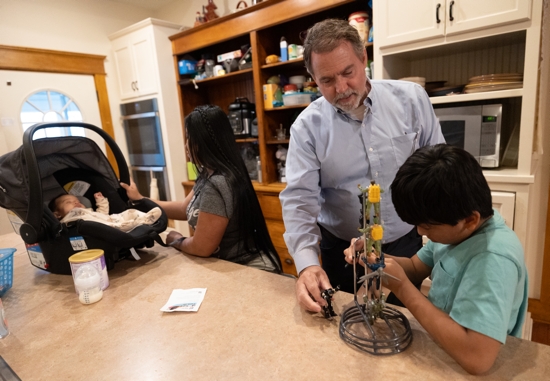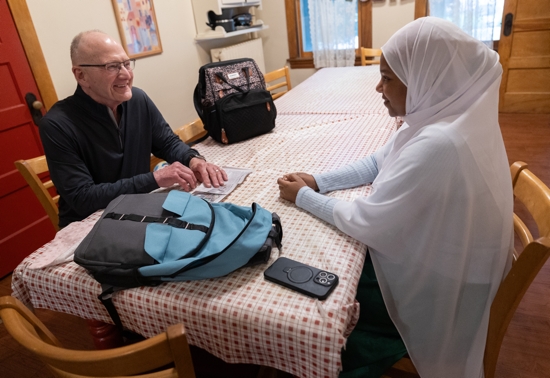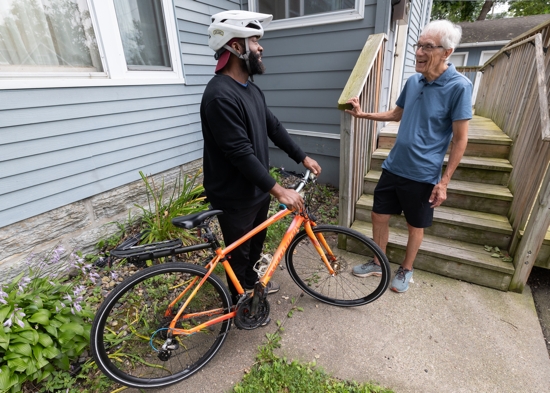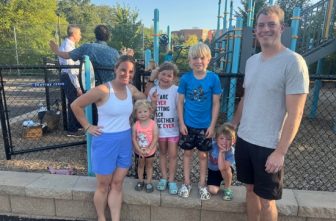
The Ignatian Volunteer Corps (IVC) is an organization comprised of senior volunteers committed to bringing Christ’s love into their own lives and the people they serve.
At the heart of IVC is a reflection process that is analytical and spiritual — guiding volunteers in the ongoing search for the presence of the living God while serving the needs of others, several people involved in the corps in the Archdiocese of St. Paul and Minneapolis said.
“IVC invites mature individuals to serve people who are poor, work toward a more just society and deepen their Christian faith through the Ignatian tradition,” said Steve Hawkins, director of the Ignatian Volunteer Corps Twin Cities. “At its heart, this charism is about finding Christ in all people and all circumstances — and responding with compassion, justice and love.”
Headquartered in Baltimore, IVC was founded in September 1995 by two Jesuit priests, Father Jim Conroy and Father Charlie Costello. Their vision was simple: Create a program for retired and semi-retired adults, ages 50 and over, with two central components: direct service to the poor and intentional reflection on that service and ministry to others.
From an initial group of two Jesuit directors and 11 lay volunteers, IVC has grown into a national network of 20 regional chapters, with nearly 600 volunteers, also known as IVC Service Corp Members (SCM), serving at more than 300 nonprofit partner agencies. The Twin Cities chapter of IVC was established in 2002.
From September through June, Ignatian volunteers dedicate one or two days each week to support nonprofits that serve marginalized communities, contributing in diverse ways — offering health care, teaching, social work, job training and direct service to those in need.
“Many also provide coaching to nonprofit leaders, as well as expertise in finance, human resources, administration and fundraising,” Hawkins said. “In every role, SCMs help increase the capacity and impact of the organizations they serve.” Each service site partner pays an annual “partnership fee” for each Ignatian volunteer to support and sustain the presence of IVC in their region.
IVC sustains its members through a process of reflection rooted in the spiritual exercises of St. Ignatius of Loyola. This involves having spiritual conversations with others, praying, reading, maintaining a journal, participating in group reflection and attending various short retreats each year.
Each month, volunteers gather as a community to share their experiences, pray and reflect. Retreats or days of reflection offer additional opportunities for community reflection, prayer and support. Volunteers seek God’s presence in every encounter and bring their experiences back to the community, Hawkins said.
“While rooted in Catholic tradition, Ignatian spirituality is ecumenical — welcoming people of all Christian denominations and even other faith traditions,” Hawkins said. “Its focus on finding God in all aspects of life, along with its emphasis on personal discernment and spiritual growth, resonates with individuals from many backgrounds.”

IVC and ministry
While IVC is managed by the national staff office in Baltimore, regional directors and coordinators oversee local IVC programs throughout the country. In the Twin Cities, Hawkins and his team recruit and train volunteers, work with partner agencies and organize individuals trained in Ignatian spirituality to reflect with volunteers on their service experience. They also manage day-to-day aspects such as promoting IVC, fundraising and coordinating events.
Members of IVC in the Twin Cities and volunteers across the nation are recruited and supported by IVC’s regional staff members. Volunteers typically serve two to three days a week for 10 months. Many volunteers renew their IVC commitment year after year.
Twin Cities IVC volunteers serve at partner organizations, and IVC works to match each volunteer’s talents and strengths with the needs of an organization. While volunteers’ former job experiences come into play, many volunteers also expand their horizons by embracing new opportunities that may lead to new skills. IVC volunteers are usually given two or three potential volunteer sites where they will interview. The volunteer and the partner service site discern if it is the best match for both.
After joining IVC, volunteers are assigned an IVC spiritual reflector among lay persons, vowed religious and priests who have experience in Ignatian spirituality. Each spiritual reflector meets monthly with individual Ignatian volunteers to talk about the service work and spiritual journeys that grow out of that work.

Casa Guadalupana
Casa Guadalupana in St. Paul offers a safe and supportive home for individuals and families who have fled their homelands due to war or persecution and are seeking asylum in the United States. The mission is to affirm each person’s dignity and help them find safety and stability. IVC volunteers serve as mentors, assisting asylum seekers with applications, helping them learn about American culture and guiding them through daily challenges such as health care and transportation.
“Just as importantly, they listen, encourage, and walk alongside these families as they pursue their hopes and dreams,” Hawkins said.
Paul Godlewski said he first became aware of the Ignatian Volunteer Corps 30 years ago, while he was on his first retreat at the Demontreville Jesuit Retreat House in Lake Elmo. Some of his fellow retreatants were active members of IVC.
“As I approached retirement, the IVC became an attractive organization for me to consider for post-retirement volunteer work,” Godlewski said. “Also, my parish of St. Thomas More in St. Paul is the only Jesuit parish in Minnesota and the Jesuit priests always mentioned IVC as a potential worthwhile organization to consider in retirement, especially for someone like me who has always been active in volunteer activities throughout my adult life.”
Godlewski also participated in “The Next Chapter” program at The University of St. Thomas in St. Paul, a six-month, guided journey using principles of Ignatian spirituality to assist participants in discerning what God might be calling them to in their retirement. IVC was presented as one of many options for participants of the program to consider for their post-retirement active engagement goals.
A retired personal injury trial lawyer of 50 years who retired in December 2023, Godlewski said he was active throughout his career on committees for the Minnesota Association for Justice. He served on parish councils, taught religion classes and was active in the Knights of Columbus.
At his parish, Godlewski is a Eucharistic minister, lector and usher. He volunteers on Fridays at Casa Guadalupana and participates in other IVC activities.
“Helping others and working with like-minded volunteers and organizations is a very enriching and humbling experience,” Godlewski said. “Volunteering without the expectation of any compensation is a spiritual blessing and grace that brings peace of mind in what I hope is what God expects of me.”
For Godlewski, 78, one of the most impactful components of his IVC volunteer role is Casa residents’ appreciation — and their special gifts to him.
“How they work hard to become successful and productive citizens of our country is so impressive to me that I realize they are giving to me so much more than I could ever give to them,” Godlewski said. “There is a gratification that in some small way I am responding to what God expects of me — and the grace of peace of mind and tranquility of heart and spirit that I am using my gifts and talents to the greater glory of God: AMDG!” (Ad Maiorem Dei Gloriam, which translates to “For the Greater Glory of God.” It is a motto widely associated with the Jesuits and the broader Ignatian tradition in the Church.)
For Godlewski, his experience as an attorney helped make his placement at Casa Guadalupana the ideal fit.
“Steve Hawkins is very diligent in matching skill sets for IVC volunteers,” Godlweski said. “In my case, it was a match made in heaven. I was able to immediately become deeply involved in the residential community of Casa Guadalupana,” Godlewski said. “The director, Dave Haley, and his board and trustees are now considering a careful expansion of their vision and mission for other asylum residential communities like Casa. I plan to remain involved with the ongoing expansion of the mission. There is no model for what they have done from their hearts and beliefs, no mega-corporation or other incentives. Dave and his board and trustees are the real deal — they walk the walk and can talk the talk with no ulterior motives, just love for the immigrants and asylum seekers.”
Joseph Hammell also first learned about IVC several years before he retired, through information pamphlets that were available at Demontreville.
“I have been attending retreats at Demontreville for several years — a retreat at Demontreville is a great way to develop a more grounded life and a closer, intimate relationship with our loving God,” Hammell said. “IVC seemed like an excellent way to have a meaningful, purposeful life in retirement, drawing closer to God with prayer, community and service.”
Hammell, 64, began volunteering at Casa Guadalupana soon after joining IVC in January 2022. Before retiring, he was an attorney in private practice.
Generally, he volunteers at Casa two days a week for six hours a day, although occasionally he serves longer hours or additional days when there is a particular need.
“The work we volunteers do at Casa is diverse and interesting, essentially helping our residents with whatever needs they may have to the extent we are able, and if we cannot help, then lining them up with other needed resources,” Hammell said.
Hammel said a partial list of things he has done include helping residents find a lawyer and gathering information, documents and statements needed for their immigration cases. He also has helped prepare resumes, job applications and cover letters; prepare and file tax returns; open bank accounts; practice driving for the driver’s test to obtain a license; buy a car and obtain auto insurance; drive residents to school, medical appointments, job applications and various other appointments; and choose a cell phone plan.
“Of course, another important role we play is simply to be present at the house, available to talk with residents about any issues or questions they may have,” said Hammell, who belongs to the Basilica of St. Mary and St. Olaf, both in downtown Minneapolis.
“For me, the most enjoyable and impactful part of serving at Casa has been the privilege and blessing to become friends with and part of the families at Casa,” Hammell said. “I have attended multiple weddings, baby showers, birthdays and other celebrations of life. We have done joyous things together, like holiday celebrations and fun excursions, such as a day at the lake. It is (having) the personal connections with both residents and other volunteers.”
As retired attorneys, Godlewski and Hammell also help the IVC Twin Cities team with issues that may emerge. Haley said he turns to Hammel and Godlewski for help in his role as board chair, and to help Casa’s current director, School Sister of Notre Dame Stephanie Spandl, as they wrestle with challenges that might arise with any family at Casa.
“They also provide a caring and involved presence that means the world to individuals and families seeking asylum,” Haley said. “Joe and Paul have expanded the number of items we can support each family with. They provide flexibility and more hours to spend in accompanying everyone as they continue building their new lives in Minnesota. They come with a caring approach that reassures people who have entered a new world. This work is a labor of hope and supporting some amazing individuals who have a lot of skills and resilience even after their lives have been violently disrupted.”
Looking ahead, Hammell said he is excited about his role in IVC and volunteering at Casa, particularly in helping Casa residents as they seek asylum in the United States. He also looks forward to seeing residents develop the foundation they need to leave Casa and live independent and successful lives in the United States. Finally, he’s eager to meet and work with new residents who come to Casa.
“I look forward to Casa’s ability to expand the number of people it can serve and the range of services it can provide through the generous contributions of time and treasure by the many existing and future friends and supporters of Casa,” Hammell said. “I also look forward to growing in my ability to see God in my brothers and sisters and better appreciate the blessing it is to be able to serve and work with them. Jesus teaches that we are all God’s children, one family, and that we should be united in love. Being privileged to serve at Casa has given deeper meaning to this vital message and an excellent opportunity to practice and improve on my efforts to live out this essential truth.”
THE IGNATIAN TRADITION
Ignatian spirituality is best summed up in one phrase — “Finding God in all things,” not just in explicitly religious situations or activities.
- Sees life and the universe as a gift, calling forth wonder and gratitude.
- Gives ample scope to imagination and emotion as well as intellect.
- Cultivates critical awareness of personal and social evil, but points to God’s love as more powerful than any evil.
- Stresses freedom, need for discernment and responsible action.
- Empowers people to become leaders in service, “men and women for others,” building a more just and humane world.



